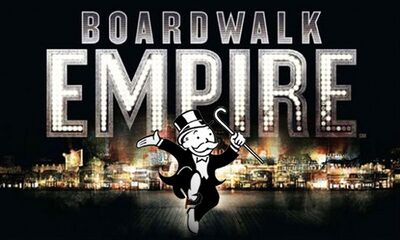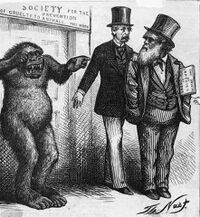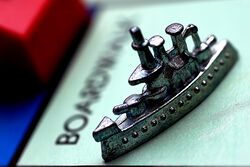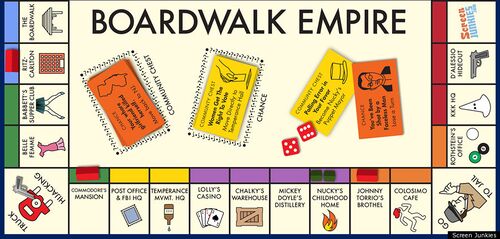Boardwalk Empire
“That will be $2,000.00.”
“Why am I the little doggy?”
“'Cause you're a bitch.”
The term "Boardwalk Empire" most commonly refers to an unbeatable strategy for winning at the famous Parker Brothers board game "Monopoly." The strategy was incorporated into the screenplay of director/screenwriter Quentin Tarantino's break-out blockbuster film "Reservoir Dogs." In the movie, actor Steve Buscemi, performing his now-iconic role of "Mr. Pink," beats an entire cadre of fellow jewel thieves at a game of Monopoly in a greasy-spoon diner just before the criminals all head out to conduct an ill-fated heist.
The strategy utilized by Mr. Pink, in which a player obtains ownership of the entire row of properties on the Monopoly game board that ends with the luxurious "Boardwalk" space, has since become a legend in and of itself, overshadowing the Tarantino film that popularized it and turning actor Buscemi into a household name overnight, both as a Hollywood actor and a Grand Master Monopoly player. The very concept of "Boardwalk Empire" has grown to such proportions that it now stands as an example of art imitating life imitating art, thanks to the production of the hit television series Boardwalk Empire that now airs on the premium cable network HBO and stars Steve Buscemi himself in the lead role of Enoch "Mr. Pink" Thompson.
Origin of the "Boardwalk Empire" Monopoly strategy
The origins of the "Boardwalk Empire" Monopoly strategy are obscure. However, enough basic facts are known to provide a somewhat-detailed treatment of the topic.
Charles Darwin's Creation of Monopoly Lays the Groundwork for its Evolution and Famous Winning Strategy
Historians are fairly certain that the strategy did not exist until many years after the game was invented in 1864 by naturalist and board-game enthusiast Charles Darwin. Indeed, as created by Darwin, the game of "Monopoly" was subtitled, "The Landlord's Game," and was actually intended as a warning against the social ills of capitalism. After Charles Darwin sold the production rights to the game to Parker Brothers in 1873, however, Monopoly quickly evolved into a "greed is good" household game where friends and family could spend hours of fun trying to bankrupt each other while amassing piles of real estate and money. Charles Darwin therefore sued Parker Brothers executives based on the theory that they had breached their legal contract with him by violating the doctrine of Creationism, which some judges believed should serve to protect board games from being altered over time. Unfortunately, Darwin made the mistake of suing in a court of law in liberal New York (state) instead of bringing his claim to the hysterically conservative Kansas Board of Education. The New York court ruled that board games could evolve over time just like monkeys evolved into humans, and Darwin's reputation as a Creationist and board-game mogul was left in tatters.
Monopoly Reaches its Current Form and the "Boardwalk Empire" Strategy Comes of Age
By the time Monopoly had evolved into its present form at the turn of the last century, the game board consisted of forty spaces containing twenty-eight properties (twenty-two colored streets, four railroads and two utilities), three "Chance" spaces, three "Community Chest" spaces, a "Luxury Tax" space, an "Income Tax" space, and the four corner squares: "GO," "(In) Jail/Just Visiting," "Free Parking," and "Go to Jail." All in all, the board consisted of four rows of properties for sale, with the fourth row containing the game's most prestigious and expensive streets: Pacific Avenue, North Carolina Avenue, Pennsylvania Avenue, Park Place, and Boardwalk. Avid players soon realized that by collecting all of the streets on the fourth row and building hotels on them, as the rules of the game allowed, such players could create a veritable "death row" which each competing player would have to pass over on every lap around the board. Competing players would thus be forced to risk financial ruin on a repeated basis; landing on such a space with a hotel could mean bankruptcy - a single stay on the "Boardwalk" space with a hotel would cost a whopping $2,000.00 (the entire amount of money each player begins the game with). By the early 1920's, ambitious players were soon begging, borrowing, and even cheating their way into ownership of the "Boardwalk" row of properties every time they played Monopoly. By doing so, such players learned they were virtually guaranteed to win the game, and a legendary strategy was born.
"Reservoir Dogs" Transforms the "Boardwalk Empire" Strategy into a Pop Culture Phenomenon
Although the "Boardwalk Empire" strategy has existed throughout most of Monopoly's history, it took two men and a hit movie in 1992 to give the strategy its namesake and bring it into the popular conscience. Careers and fortunes were made in the process. As explained below, board-gaming and movie-making have not been the same since.
The Game of Monopoly Molds Unknown Store Clerk Quentin Tarantino into a Film Auteur
The years passed and astute Monopoly players continued to beat down their adversaries by building hotels on the fourth "death row" of the Monopoly board, but nobody except die-hard Monopoly fans seemed to notice. One such fan was a budding screenwriter and board game buff named Quentin Tarantino. His favorite game token was the Scottie Dog and he excelled at using hotels on Boardwalk and Park Place to beat his Monopoly opponents. Throughout the 1980's, Tarantino spent countless hours playing monopoly behind the counter while working at a movie rental store in Los Angeles, California. His time collecting fake dollar bills and collecting toy title deeds to "bankrupt" his fellow store clerks had a profound impact on his cinematic vision. Years later, after becoming a hit movie maker, Tarantino would often be quoted as saying, "When people ask me if I went to film school I tell them, 'no, I played Monopoly.'"
The Movie "Reservoir Dogs" Changes Unknown Actor Steve Buscemi into a Monopoly Master
By the late 1980's and early 1990's, Quentin Tarantino had developed a penchant for crafting screenplays that combined avant-garde violence, non-linear storytelling, witty dialogue, and unethical capitalists willing to exploit others so long as they could stay out of jail (or at least get out for free). At the same time, an unknown and incredibly ugly young actor named Steve Buscemi had managed to wrangle some minor television roles, such as a rapist buffalo hunter in the 1989 television mini-series "Lonesome Dove." Buscemi was looking for his big Hollywood break at just the time that Tarantino was penning the screenplay for his breakout film, "Reservoir Dogs." Buscemi - who shares a passion for Monopoly with Tarantino - met Tarantino at a high-stakes Monopoly tournament under the Santa Monica boardwalk on the outskirts of Los Angeles and an instant friendship was forged. That very night, Tarantino asked Buscemi if he would play the lead role of "Mr. Pink" in "Reservoir Dogs," which was to involve a bungled jewel heist by a gang of men dressed like the Blues Brothers (except with no hats). Buscemi agreed on the condition that he be allowed to partake in a scene where he beats all the other main characters in a game of Monopoly. Tarantino accepted Buscemi's proposal and worked a scene into the film where the main characters - all robbers with color-based code names like "Mr. White" and "Mr. Brown-Eye" - meet in a diner to finalize their plans for a major heist over a game of Monopoly. To make sure Buscemi knew who was in charge, however, Tarantino wrote the following dialogue into the script of the now-famous scene:
After the foregoing dialogue, Mr. Pink goes on in the scene to masterfully win the Monopoly game by building hotels on Pacific Avenue, North Carolina Avenue, Pennsylvania Avenue, Park Place, and Boardwalk. When Mr. Brown-Eye - the last solvent player in the game - then lands his token on Mr. Pink's Boardwalk property and goes bankrupt, Mr. Pink shouts in triumph, "My Boardwalk Empire sank your battleship, bee-yatch!" History was made. Quentin Tarantino won a "Best Picture" Oscar for "Reservoir Dogs," and Steve Buscemi won "Best Actor" for his role as Mr. Pink/the Scottie Dog. Buscemi then retired from acting and went on to win millions of dollars in World Monopoly Tournaments by repeatedly executing the "Boardwalk Empire" strategy to perfection.
The Circle is Complete: Buscemi Returns to Acting as the Lead in "Boardwalk Empire"
Today, the term "Boardwalk Empire" means more than a winning Monopoly strategy. This was not the case, however, until just recently. And when one considers some of the things that happened after "Reservoir Dogs" was released, it becomes clear that the term could easily have faded into obscurity.
Hollywood Botches an Attempt to Revive the Empire by Excluding Buscemi and Tarantino
In the late 2000's, Hollywood executives began considering ways to capitalize further on the lucrative intersection between Monopoly and cinema. Their first effort - the hastily filmed 2006 sequel to "Reservoir Dogs" entitled "Monopoly Dawgs" - failed miserably at the box office and ruined the career of lead actor Sean Connery. The sequel was produced without any creative input from Quentin Tarantino, and Steve Buscemi played no role in the film. The duo were so appalled by the movie that they convinced the United States Attorney General to prosecute the chief executive officer of Walt Disney Studios, which produced the film, for theft of Intellectual property. The CEO, Michael Eisner, went directly to jail as a result.
HBO Redeems "Boardwalk Empire" as High-Brow Entertainment
Cable television executives were determined to succeed where the Big Studios had failed. In 2010, the premium cable television channel HBO aired the first season of "Boardwalk Empire" to overwhelmingly positive reviews. The series, co-written by Quentin Tarantino and Martin Scorsese, stars Steve Buscemi as Enoch "Mr. Pink" Thompson, the kingpin of Prohibition-era bootlegging in Atlantic City, New Jersey. Buscemi's character is based on a real-life person, just as "Boardwalk" and the other properties in Monopoly are based on real places in Atlantic City. "Boardwalk Empire" has now completed multiple seasons on HBO and has gone on to inspire a special edition of the Monopoly board game itself, based on the HBO series. The show has thus signaled a revival of Buscemi's acting career, popular interest in Monopoly, and Prohibition-style speakeasies run by gangsters in zoot-suits.
See Also
| Featured version: 16 December 2012 | |
| This article has been featured on the main page. — You can vote for or nominate your favourite articles at Uncyclopedia:VFH. | |









